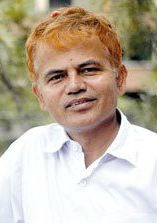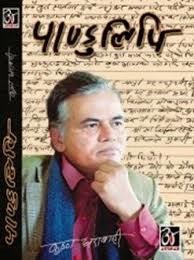KRISHNA DHARABASHI

Krishna
Dharabasi Bhattarai is a novelist of Nepal and a winner of the Madan Puraskar award with his book Radha (2005). His novel Jhola has been
adapted into a film by the same title.
After reading his books like Radha, Jhola, Aadha
Bato and Padhulipi, I became a huge fan of his. These books had emotional which
touches the heart of the people. Krishna Dharabasi wrote those books with his
heart and soul.
Radha is
a 2005 novel written by Krishna
Dharabasi and winner of Madan Puraskar.
The novel was an adaptation of the ancient Sanskrit epic Mahabharat,
giving greater prominence to the character of Radha. Inspired by Jacques
Derrida's Theory of Deconstruction, Dharabasi completely changed the
characters of Radha and Krishna, making Radha is brave, dignified and
revolutionary.
The
plot of Radha reflects the situation in Nepal at the time of
its publication, especially the Nepalese Civil War.
Radha
is an example of “Lila Lekhan”, a Nepalese metaphysical novel concerned with
explaining the features of reality that exist beyond the physical world and our
immediate senses, for which Dharabasi is known.

Jhola, on the other hand, is about Sati custom is an ancient practice of burning a widow on her
deceased husband's funeral pyre or burning her alive in his grave. According to
Hindu Scriptures, the custom of Sati was a voluntary practice in which a woman
voluntarily decides to end her life with her husband after his death. But later
the practice was abused and women were forced to commit Sati or were even
dragged against their wish and put into the burning pyres. Historical accounts
show that several Royal and common women were burnt alive through this savage
practice. In BS 1977 Ashad 25 (1920 AD), Chandra Shumsher
J.B.R. officially
abolished the Sati system from Nepal.
![झोला [Jhola] by Krishna Dharabasi](https://i.gr-assets.com/images/S/compressed.photo.goodreads.com/books/1581868093l/21974963._SY475_.jpg)
Kanchi is a young woman who was married to an old husband who
is 40 years elder. In present, Kanchi's husband is ill because of his old age
and finally dies. Now, as per the social rules and regulations, Kanchi had to
go Sati where she should burn herself with her husband's deceased body. But,
fate is on her side and she manages to survive. She starts to live in the cave
of a nearby jungle. Ghanashyam being lonely in the absence of his loving mother
visits the jungle and finds his mother hiding in the cave. Kanchi unites with
her son but they are unable to stay in the same society because the society
people would kill the women even though they have survived Sati in any means.
Ghanashyam makes a plan of leaving the village and getting settle in other
places so that they could make a new beginning. He asks his mother to stay in
the jungle and goes home to bring their belongings. Later, Kanchi's
brother-in-law and his wife join and assist them to leave the village. As
Kanchi with son Ghanashyam is going to leave the village, they witness a woman,
who is to be Sati but couldn't do so and runs away, being killed by the people
of the funeral.
Aadha Bato and Padhulipi are about his life and his struggle.
This book also describes the true love between husband and wife. When his wife
dies, what happens to his life is explained and how he came out is explained.

Honestly, I love his writing skills. After those books, he
somehow started to be commercial. Books like Great Falls, Gestapo, Lilabodha,
etc. I didn’t like those books that much as before. He used to write full of emotions.
He used to capture the readers by his heart-touching story but after his autobiography,
he somehow lost his charm of writing. It feels that he is rushed to finish the
book rather than giving the quality of books. Somehow the emotions have lost in
the rush of writings. I wish he could come with the quality books like before.
Comments
Post a Comment